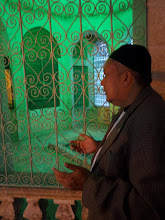After the passing away of
the Prophet Muhammad s.a.w., the seed of Islam was already flourishing in most
of the Arab world through the untiring and divinely-inspired efforts of the
Companions and Tabiin’s. The years between 12th to 17th centuries,
may be considered - the proverbial ‘golden age’ of Islam as the religion was
given a free passage by the Ottoman Empire over
its entire dominions which had penetrated deep into Southeast Europe, Northeast
Africa and Southwest Asia .
Having defeated all of its contemporary empires, including the Byzantine Empire which held court in Constantinople, now known as Istanbul , the Ottoman
Empire can be considered then as a superpower.
Just as the influence of
the Ottoman Empire had declined to the point of being labeled as the “sick man
of Europe” towards the 19th century, a
divinely-inspired Turkish scholar, Said Kurdi (as he was of Kurdish ethnicity)
appeared in the wilderness of Turkey province of Nurs
 |
| Imam Bediuzzaman Said Nursi |
A proponent of Islamic
resurgence in Turkey Turkey
Gifted with Divine inspiration and wisdom, most of Bediuzzaman Said
Nursi’s expositions were extemporaneous, without the aid of reference books or
research materials. But the substance of his works was beyond reproach, as they
were found to be scientifically accurate as well as spiritually and
philosophically excellent.
Exponent of non-violence
An advocate of
non-violence, Bediuzzaman Said Nursi never even insinuated to take revenge for
the sufferings he had gone through. Any human being subjected to such inhuman
treatment he had suffered in the hands of his detractors would have thought of
violent reprisals or retaliation in whatever form. But he never advocated
violence especially against his own people and the Turkish government, rather
he only taught his students to embrace patience and self-restraint in face of
any provocation either coming from the government or their compatriots. His
rationale is that rulers come and go, and even the Constitution of any nation
could change. His concern was always for nationalism, peace and the peoples’
subservience to the rule of law. For these and many other reasons, his legacy
as an advocate of freedom and non-violence must have dwarfed the achievements
of some internationally recognized icons, like Mahatma
Gandhi of India and the like.
However, Said Nursi was
against foreign invaders that threatened to overthrow the Constitutional
government in his native Turkey Korea
Vision of Future
Undoubtedly, the Holy
Qur’an is the greatest miracle mankind has ever received from God Almighty. The
Qur’an embodies the relationships between the creatures and the Creator and His
greatness over all His creations. So far, no other human being has surpassed
the achievements of Bediuzzaman Said Nursi in having digested the Holy Qur’an
more extensively and comprehensively in a commentary than the “Risale-i Nur”.
The visionary Bediuzzaman had fathom the success and greatness of Islam in the
Holy Qur’an, in comparison to the other great religions in future. Hence, in
the race to gain more adherents, he foresaw that Islam will prevail over all
other religions being propagated throughout the world today. What Bediuzzaman
has foretold over half a century ago, Western and European governments and
their mainstream media are now admitting that Islam is the fastest growing religion in the West.
In Malaysia
The triumph of Bediuzzaman
Said Nursi’s patience and perseverance in the struggle to carry on the torch of
Islam amidst unbearable obstacles applied by the forces of darkness aimed at
suppressing and scuttling the sacred light of Islam in
Turkey, is unprecedented in the annals of Islamic history after the
advent of Prophet Muhammad (peace and blessings of Allah be upon him). His
selfless sacrifices and the unfailing support of his students and the masses
are not only worth emulating, but must also be kept alive as topics for group
discussions and for orientations of Islamic workers, especially those involved
in “Jihad Fi-Sabilillah.” Said Nursi’s “Risale-i
Nur” is a testament to his Divine Inspiration, a treatise par excellence on
Islam’s transition to the future.
Ahmad Azam Abdul Rahman
Chairman, Future Global Network Foundation
Deputy Secretary General, Union of NGOs in the Islamic world (UNIW), Turkey




No comments:
Post a Comment